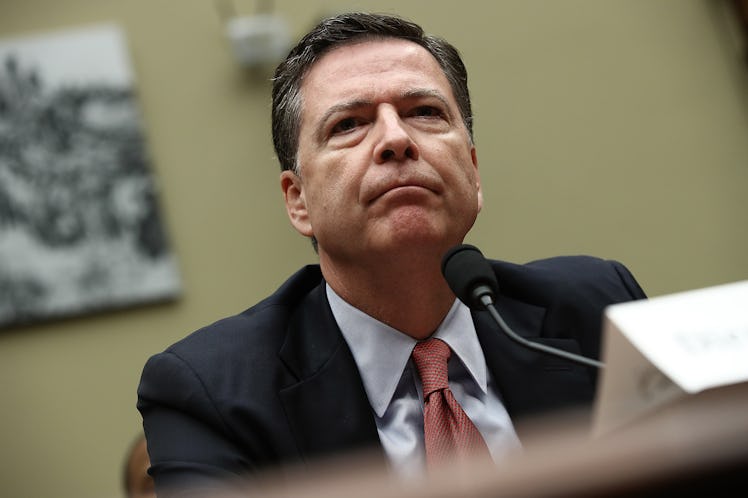
The Justice Department's IG Report Is Coming & It's All About Clinton, Comey & Trump
Thursday, June 14, is a day that critics of the Department of Justice (DOJ) and the FBI have been waiting for. That's because Thursday marked the scheduled release of the DOJ's inspector general (IG) report, which is likely to dominate the political conversation for the weekend. Before the IG report takes over news headlines, though, it's worth circling back to a simple question: What is the IG report in the first place?
The IG report is the result of an investigation that has lasted nearly a year and a half, conducted by the Justice Department's inspector general, Michael Horowitz, who serves as an internal watchdog within the agency.
In January 2017, a week before President Donald Trump was inaugurated, the inspector general announced that he would "initiate a review of allegations regarding certain actions by the Department of Justice (Department) and the Federal Bureau of Investigation (FBI) in advance of the 2016 election."
In other words, Horowitz had an objective to revisit the FBI's practices in 2016, particularly as it relates to investigating Hillary Clinton's use of a private email server and investigating potential ties between the Trump campaign and Russian efforts to influence the election. The January 2017 announcement from Horowitz notes that the review was initiated in response to public scrutiny of the FBI and calls from congressional leaders that sits at the head of oversight committees.
Between the time that the review was announced — during the last days of President Barack Obama's administration — and present day, the harshest critics of the Justice Department have anticipated the release of the report, That's because the report is expected to reveal whether officials in charge of investigating Clinton and the Trump campaign acted inappropriately.
The most notable critic is none other than the president himself, who on June 5 tweeted, "What is taking so long with the Inspector General’s Report on Crooked Hillary and Slippery James Comey. Numerous delays. Hope Report is not being changed and made weaker! There are so many horrible things to tell, the public has the right to know. Transparency!"
On Thursday afternoon, the wait was over. The inspector general released his 568-page report, and it contained plenty of critiques of the FBI under Comey.
At one point, the report criticizes Comey for two announcements — one on June 5, 2016 and the other on October 28 the same year. The first date was when he announced why the FBI wouldn't prosecute Clinton, and the second date was when he announced that the FBI was reviewing additional emails days before the election. The report reads,
We concluded that, in considering his choices, Comey failed to give adequate consideration to long-established Department and FBI norms, policies, and expectations that he applied in other cases. Although we acknowledge that Comey faced a difficult situation with unattractive choices, in proceeding as he did on October 28, Comey made a serious error of judgment. Much like with his July 5 announcement, Comey engaged in ad hoc decisionmaking based on his personal views even if it meant rejecting longstanding Department policy or practice.
At another point, the report details text messages between two agents whose names had become synonymous with critiques of the FBI, Peter Strzok and Lisa Page. Horowitz wrote,
Nonetheless, the implication in certain Russia-related text messages that Strzok might be willing to take official action to impact presidential candidate Trump’s electoral prospects — for example, the August 8, 2016 text exchange in which Page asked Strzok “[Trump’s] not ever going to become president, right? Right?!” and Strzok replied “No. No he won’t. We’ll stop it” — caused us to question the earlier Midyear investigative decisions in which he was involved, and whether he took specific actions in the Midyear investigation based on his political views.
Then there's another significant part. On the 263rd page of the report, Horowitz concludes that the result of the Clinton investigation was ultimately unaffected by biases among investigators.
"We found no evidence that the conclusions by Department prosecutors were affected by bias or other improper considerations; rather, we concluded that they were based on the prosecutors’ assessment of the facts, the law, and past Department practice," the report read.
Overall, the report contains many more highlights, and much more criticisms of Comey, and promises to lead to one thing: debates over which of those highlights is most damning and most consequential.